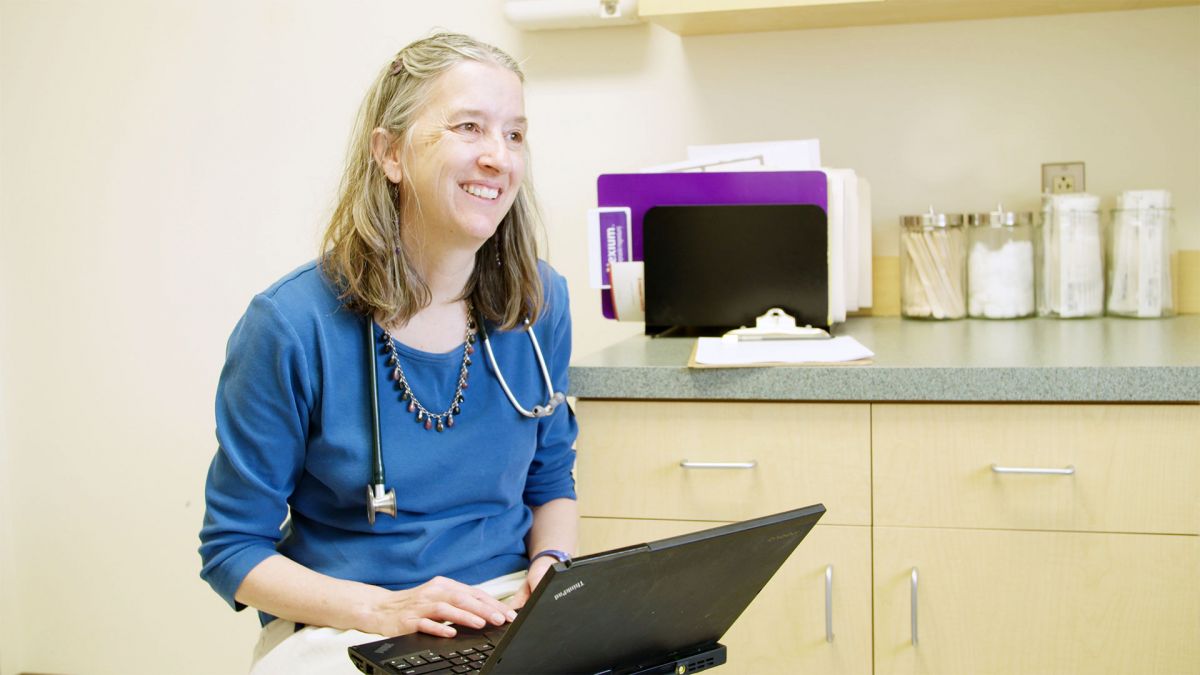
Leslie Hayes knew she wanted to become a doctor from a very young age. She was raised in Los Alamos, New Mexico, a community that hosts a national nuclear laboratory and that boasts the highest rate of PhDs per capita in the nation. She came to El Centro, the rural health care network in New Mexico depicted in the film The Providers, because she wanted to practice medicine in a place where her services were needed. As one of the few remaining primary care doctors in the region who delivers babies, Leslie is often on call for deliveries several days a week. Like Matt Probst, also in the film, Leslie was raised in a family that struggles with substance use disorder, although her grandfather’s successful recovery is part of what inspires her treatment of her patients. She was kind enough to write a journal about just one day on the job, where every patient and situation is unique.
By Dr. Leslie Hayes
There is no such thing as a typical day in family medicine. Most days involve some children needing well-child care, some pregnant patients, adults needing care for multiple chronic illnesses, and walk-in patients with bladder infections or colds or a musculoskeletal problem. In addition, because I prescribe buprenorphine, I see several patients with opioid use disorder.
However, some days, it seems I see a whole lot of small kids with respiratory infections. Other days, I see several patients having trouble getting diabetic shoes or oxygen or wheelchairs. Every day is different.
1) Hep C Patient
A recent day in clinic began with a patient who had been treated for hepatitis C. Treatment had been successful. Because he had cirrhosis, we had done a screening blood test for liver cancer. That had come back positive, and a CT scan had confirmed the diagnosis of hepatocellular carcinoma. The patient was able to get treatment and is doing well. He has been quite happy in recent visits to have survived.
2) Mother and New Baby
The next two patients were a mother and her new baby. Physically, the mother was doing well, but she was struggling with baby blues. We talked a lot about the treatment of postpartum depression and the importance of taking care of herself. Her baby was spitting up a lot. The baby was gaining weight, but the spitting up was more than I expected, so we talked about what testing we would do if it didn’t improve with conservative measures.
3) Middle-Aged Man
The next patient was a middle-aged man with multiple medical problems. He had started exercising recently, and he was doing quite well. My biggest worry with patients with many medical problems is that I will forget to follow up on one of them, and it will cause the patient [issues]. I try to choose two or three problems with each visit and make sure I rotate between focusing on all the major problems over the course of a year.
4) Chronic Pain for a Caregiver
Later in the morning, I saw a patient with severe chronic pain who recently had to provide significant care for a sick family member. Because of the physicality of the work, her pain was much worse. She begged me to increase her pain medications so that she could lift her family member more easily. I was quite worried that if I increased her pain medications, she would lift unsafely or too much and cause more damage to her already damaged joints and back.
We discussed other options, such as talking to her mother’s provider about a lift or more help, or PT for the patient. She did not feel any of them were doable. I don’t think either of us felt very satisfied at the close of the visit.
5) Young Mother with Addiction
Another patient that day was a woman I really like who had been many years drug-free before a relapse two years ago. She’d unfortunately gotten pregnant before she could stop using, and had been unable to quit during the pregnancy. She and the baby had both done well medically, with minimal signs of withdrawal in the baby. However, because of her drug use, she was involved with child protective services. At this time, she is working hard, and I truly hope she will get her life on track and regain custody.
6) Rural Child
I also saw a small child with multiple medical problems. The single mother does not have a reliable vehicle or cell phone and lives in a fairly rural area. We have tried to help her with resources, but they aren’t always reliable.
The child’s specialists are in a big city with far more resources, and they are sometimes frustrated with her inability to take the child in for follow up. I am not sure all of them realize how hard she is working to provide care for this child.
7) Toddler with Ear Infections, and Day Ends
The day finished with a follow up on a toddler with multiple ear infections. He still had fluid in his ears, so I referred [them] to an ear, nose, and throat doctor to evaluate if he needed tubes.
It was mostly a good day. I always wish there was more I could do for my patients, but overall, I really like being able to help where I can, and I am grateful for my job.
A family practice physician, Leslie Hayes is distinguished by her advocacy for using medications to treat substance use disorder, especially opioid use disorder, in a primary care setting. She believes that in order for patients to have the best possible outcomes, they need evidence-based, nonjudgmental care in a place that is accessible and familiar to them. Leslie graduated from the University of New Mexico School of Medicine.

